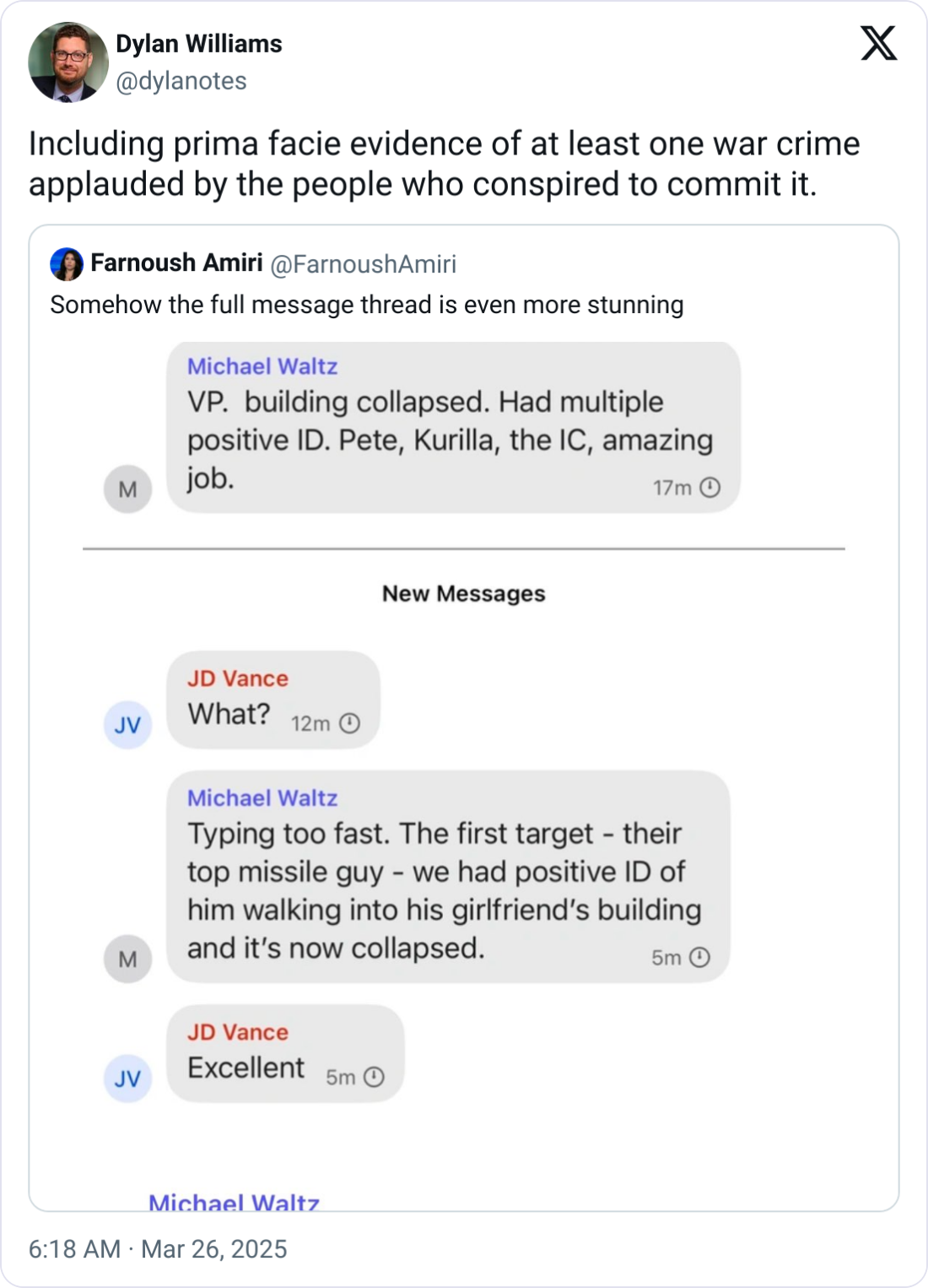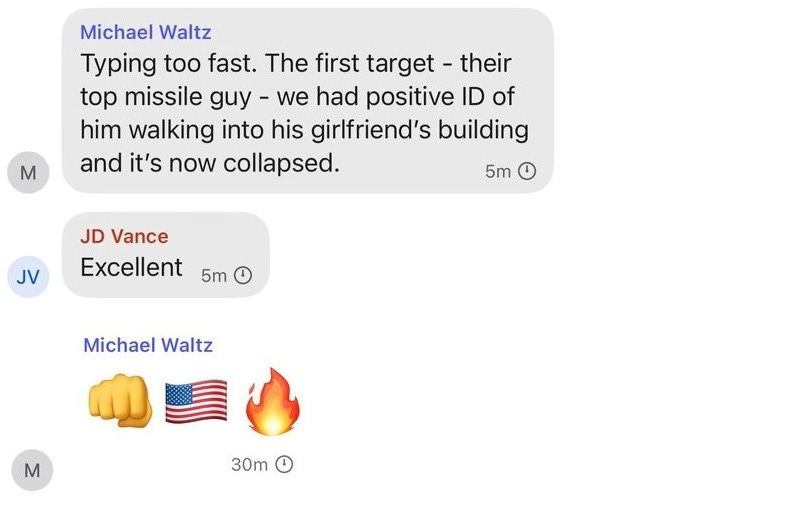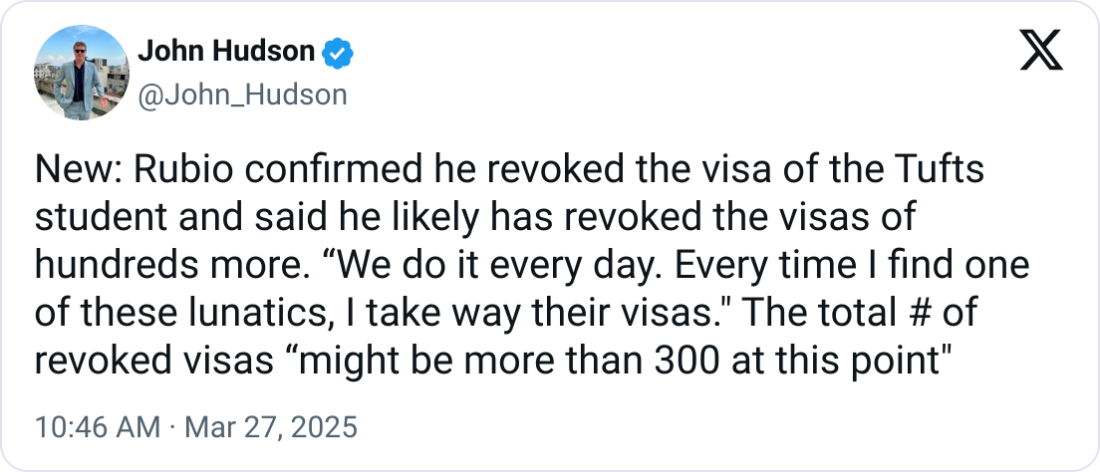War Crimes 👊🇺🇸💩
Sensitive Yemeni strike texts leak, a climate group is fined half a billion dollars for protesting, and more international students are being swept up for Pro-Palestinian sentiments.
This article is part of a digest series delivered every Thursday, highlighting what I find to be the most interesting stories covering politics, working class struggles, and international current events of the week, along with my own brief commentary.
You can get it delivered to your inbox every week by subscribing.
I’ve been working diligently on my next long form piece. A lot of research has gone into it, but it’s going to need just a bit more time. Various life circumstances have made this a very difficult month for me to devote time to Praxis.
In any case, take a look at this round-up of stories from around the web:
🤕📉 Trump Administration lowers the minimum wage for federal contractors from $17.75/hr to $13.30/hr
🇾🇪💬 The Trump Administration accidentally leaks war crimes to The Atlantic
Atlantic editor-in-chief Jeffrey Goldberg found himself befuddled when he was suddenly added to a group chat on Signal, the encrypted messaging app, with Trump Administration officials. The chat included figures purporting to be leading government officials, including Secretary of State Marco Rubio, Vice President JD Vance, Defense Secretary Pete Hegseth, and National Security Advisor Mike Waltz, amongst others. They were coordinating last week’s airstrikes on Yemen. Goldberg had assumed the conversation to be spam or an elaborate prank, until he realized that specific strike plans lined up perfectly with news of the strikes well ahead of time.
Included in the messages was a segment in which various officials celebrate the leveling of an entire residential building in order to assassinate a single target, an alleged war crime.

Notably, Jeffrey Goldberg is an ex-IDF prison guard who dropped out of an Ivy League college to serve. He once wrote about aiding to cover up prisoner abuses. Perhaps the Trump Administration felt he’d be amenable to strikes on Yemen as a result of his perceived ties to Israel, who has been the subject of the economic blockade by Yemen in the Red Sea that led to these retaliatory strikes.
In the days following the revelation, the Trump Administration has sought to deflect, misdirect, and downplay the significance of the incident. Many have rightfully questioned why sensitive military content and attack plans are being discussed on a corporate messaging platform in the first place.
⚖️🛢️ Climate group Greenpeace required by a North Dakota jury to pay a fossil fuel company $667 million for peacefully protesting
Renowned climate activist Steven Donziger (who himself was embroiled in a controversial legal battle with the fossil fuel industry) writes, “The proceedings were so deeply flawed – at core the trial was really about crushing dissent — that I believe there is a good chance it will be reversed on appeal and ultimately backfire against the plaintiff Energy Transfer pipeline company.”
Legal observers have decried the suit as a classic example of a Strategic Lawsuit Against Public Participation (SLAPP), or a lawsuit intended to dissuade public dissent on an issue. In the case, which was originally slapped down in 2019, fossil fuel company Energy Transfer argued that the climate activism group was engaging in “terrorism” by organizing peaceful protests.
The trial took place in a solidly pro-Trump county, and the majority of participants on the jury had ties to the fossil fuel industry, while none of them had indigenous ties, in spite of indigenous rights being central to the protests in question. We shall have to see how Greenpeace’s appeal proceeds. If it is determined that a mistrial took place, then Greenpeace may wind up being the ones who ultimately receive a payout.
🇵🇸⛓️ Students continue to be abducted by ICE for speaking out in favor of Palestinian rights
Here is a list representing just a small fraction of the students across the country who have been abducted or have had their visas or residencies challenged as a result of being outspoken on the issue of Palestine:
Mahmoud Khalil, the Columbia student who led negotiations between encampments and university faculty.
Rumeysa Ozturk, a Turkish student who voiced support for the Boycott, Divestment, and Sanctions (BDS) economic protest movement against Israel.
Ranjani Srinivasan, another Columbia student who lightly participated in protests in support of Palestinians.
Yunseo Chung, a resident of the U.S. since she was 7 and yet another Columbia student who participated in pro-Palestinian protests. She has thus far managed to avoid being arrested thanks to an ongoing lawsuit.
Columbia, which has a rich history of Palestinian studies, has been a particular target of the Trump Administration’s crosshairs, as protests in the spring of last year exploded when police and pro-Zionist agitators sought to enflame tensions. The federal government has cut $400 million in funding for the university. In an attempt to have this funding restored, the university has largely kowtowed to Trump’s demands, albeit to no avail so far and at the great expense of many students.




